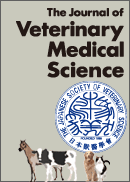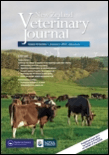
JOURNAL OF VETERINARY MEDICAL SCIENCE
Scope & Guideline
Fostering Excellence in Veterinary Science Scholarship.
Introduction
Aims and Scopes
- Clinical Veterinary Medicine:
The journal features studies that address clinical practices, diagnostics, and treatment protocols for pets, livestock, and wildlife. This includes case reports, clinical trials, and observational studies that contribute to evidence-based veterinary medicine. - Infectious Diseases and Public Health:
Research focusing on zoonotic diseases, antimicrobial resistance, and the epidemiology of infectious agents in animals. The journal emphasizes the importance of understanding disease transmission between animals and humans, especially in the context of public health. - Veterinary Pathology and Diagnostics:
The journal publishes articles on pathological studies, histopathology, and diagnostic techniques that enhance the understanding of animal diseases. This includes molecular diagnostics and immunohistochemical evaluations that aid in the identification of diseases. - Comparative Medicine and Surgery:
Research that explores surgical techniques, anesthesia, and postoperative care across various species. The journal encourages studies that compare veterinary practices and develop innovative surgical methods. - Animal Nutrition and Physiology:
The journal covers research on the nutritional requirements of different animal species, including studies on dietary supplements, metabolic responses, and the impact of nutrition on animal health and performance. - Veterinary Pharmacology and Toxicology:
Research focusing on the pharmacokinetics, pharmacodynamics, and toxicological effects of various substances in animals. This includes studies on drug efficacy, safety, and adverse reactions.
Trending and Emerging
- Zoonotic Diseases and One Health Approach:
A significant increase in research focusing on zoonotic diseases highlights the interconnectedness of human, animal, and environmental health. This trend emphasizes the importance of a One Health approach to disease prevention and control. - Genomics and Molecular Biology in Veterinary Medicine:
Emerging studies utilizing genomic and molecular techniques to understand animal diseases at the genetic level are becoming more prevalent. This includes research on genetic predispositions to diseases and the development of targeted therapies. - Telemedicine and Digital Health in Veterinary Practice:
With advancements in technology, research related to telemedicine and digital health solutions for veterinary practices is trending. This reflects a shift toward more accessible and remote veterinary care. - Sustainable Practices in Animal Agriculture:
Research focusing on sustainable farming practices, animal welfare, and environmental impacts is gaining traction. This includes studies on organic farming, antibiotic-free practices, and the use of alternative feed sources. - Behavioral Studies and Animal Welfare:
There is an increasing emphasis on research that explores animal behavior, welfare implications, and the psychological aspects of veterinary care, particularly in companion animals.
Declining or Waning
- Traditional Animal Husbandry Practices:
Research focusing on conventional farming practices and their effects on animal health has decreased. This may be due to a growing emphasis on sustainable and ethical farming methods, alongside the rise of alternative agricultural practices. - Basic Veterinary Anatomy and Physiology:
Although foundational knowledge remains essential, the journal has seen less emphasis on purely anatomical or physiological studies without direct clinical application or relevance to current veterinary challenges. - Veterinary Education and Training Methods:
Research on traditional educational practices within veterinary schools is becoming less prevalent. There is a shift towards studies that evaluate innovative teaching techniques and the integration of technology in veterinary education. - Non-Companion Animal Research:
There has been a noticeable decline in studies specifically focused on non-companion animals, such as laboratory or exotic animals, as the journal increasingly emphasizes research on pets and livestock. - Veterinary Ethics and Welfare Studies:
While still important, dedicated research on veterinary ethics and welfare has become less frequent, possibly overshadowed by more immediate clinical and health-related studies.
Similar Journals

EGYPTIAN JOURNAL OF VETERINARY SCIENCE
Connecting researchers to enhance veterinary practices.Welcome to the Egyptian Journal of Veterinary Science, a pivotal publication dedicated to advancing the field of veterinary science, particularly within the unique context of Egypt and the surrounding regions. Published by the Natl Information Documentation Centre, this journal has been a key scholarly resource since its inception in 1977, focusing on diverse aspects of veterinary medicine, including animal health, nutrition, and management practices. With an impressive editorial commitment and a wide scope covering animal science, equine studies, food animals, and small animal veterinary practice, the journal stands as a critical platform for researchers and professionals alike. While currently categorized in Q4 for Animal Science and Zoology, and achieving Q3 rankings in several other veterinary subfields, it serves as a vital avenue for disseminating innovative research and practical insights. Access to the latest findings and case studies aims to foster improved veterinary practices and enhance animal welfare standards. As we navigate the complexities of veterinary science, the Egyptian Journal of Veterinary Science remains an essential tool for those committed to the health and welfare of animals across various disciplines.

Thai Journal of Veterinary Medicine
Empowering practitioners with cutting-edge veterinary insights.Thai Journal of Veterinary Medicine, published by Chulalongkorn University, serves as a vital resource for researchers, practitioners, and students in the field of veterinary science. With an ISSN of 0125-6491, the journal has been providing a platform for the dissemination of original research and reviews since its inception, with a focus on advancing veterinary practice and animal health in Thailand and the broader Southeast Asian region. The journal is recognized in the Scopus database, currently ranked in the Q4 category for Veterinary (miscellaneous), reflecting its commitment to quality despite being in a highly competitive space. The scope of the journal encompasses a wide array of topics pertinent to veterinary medicine, ensuring accessibility to diverse veterinary disciplines. While the journal currently does not offer an open-access option, it remains dedicated to contributing valuable knowledge and insights to the veterinary community, supporting the improvement of animal welfare and public health initiatives in the region. As it continues to publish until 2024, the Thai Journal of Veterinary Medicine invites contributions that align with its objectives of fostering scholarly discourse and advancing veterinary research.

AMERICAN JOURNAL OF VETERINARY RESEARCH
Illuminating the Path of Veterinary ExcellenceAmerican Journal of Veterinary Research, published by the American Veterinary Medical Association, serves as a cornerstone of the veterinary medical community, providing essential insights from 1945 to the present. With an ISSN of 0002-9645 and E-ISSN of 1943-5681, this esteemed journal focuses on a diverse range of topics within the veterinary field, contributing to the advancement of veterinary science through rigorous peer-reviewed research. Ranking in the Q2 category in Veterinary (miscellaneous) and Q3 in Medicine (miscellaneous) category as of 2023, it holds a respectable position in Scopus rankings, further emphasizing its impact in the field. While currently not an Open Access journal, its objective remains clear: to disseminate cutting-edge research that informs clinical practice and enhances animal health and welfare. The American Journal of Veterinary Research is invaluable for researchers, professionals, and students seeking to stay at the forefront of veterinary advancements and innovations.

Kafkas Universitesi Veteriner Fakultesi Dergisi
Empowering professionals with cutting-edge veterinary insights.Kafkas Universitesi Veteriner Fakultesi Dergisi is a distinguished open-access journal published by Kafkas University’s Faculty of Veterinary Medicine in Turkey. Established in 1995, this journal has become an invaluable resource for the global veterinary community, disseminating innovative research and advancements in veterinary sciences. With an ISSN of 1300-6045 and an E-ISSN of 1309-2251, it is indexed in Scopus, where it holds a Q3 quartile ranking in the field of veterinary (miscellaneous). This situates the journal at an important crossroads of knowledge sharing, promoting scholarly communication among researchers, practitioners, and students. The journal covers all aspects of veterinary science, ensuring that it is relevant for professionals seeking to stay abreast of emerging trends and findings. With a commitment to open access since its inception, Kafkas Universitesi Veteriner Fakultesi Dergisi plays a crucial role in enhancing the visibility of research conducted in Turkey and beyond, contributing significantly to global veterinary literature.

Journal of Veterinary Research
Transforming animal health with groundbreaking research.The Journal of Veterinary Research, published by SCIENDO, is a leading open-access journal dedicated to advancing the field of veterinary science. Established in Poland and accessible globally since 2012, this journal serves as a pivotal platform for researchers, professionals, and students, promoting the dissemination of high-quality research and innovative findings in veterinary medicine. With a robust impact factor reflective of its Q2 ranking in the Veterinary (miscellaneous) category for 2023, it ranks 54th out of 194 in the general veterinary field, placing it in the 72nd percentile among its peers. The Journal of Veterinary Research explores a wide variety of topics pertinent to veterinary practice, animal health, and research methodologies, making it an essential resource for academics and practitioners alike. Authors benefit from the journal's open-access model, which ensures their research is freely available to a broader audience, thus fostering collaboration and innovation within the veterinary community.

Iranian Journal of Veterinary Research
Exploring New Frontiers in Veterinary MedicineWelcome to the Iranian Journal of Veterinary Research (IJVR), a prestigious platform dedicated to advancing the field of veterinary science. Published by Shiraz University, this journal plays a pivotal role in disseminating high-quality research findings amid a vibrant academic community. With its ISSN 1728-1997, and a convergence of studies from 2008 to 2024, IJVR serves as an essential resource for veterinarians, researchers, and students interested in Animal Science and Zoology. Recognized in the Q3 quartile for both Animal Science and Veterinary categories, it holds a respectable position with Scopus rankings placing it in the 54th percentile among general veterinary journals. Although it currently lacks an open access model, the journal ensures that cutting-edge veterinary research is presented with rigor and relevance, fostering knowledge that contributes to animal health and welfare. With its strategic focus on innovative methodologies, clinical practices, and the biological sciences, the IJVR is set to become your go-to source for critical advancements in veterinary research.

NEW ZEALAND VETERINARY JOURNAL
Driving excellence in veterinary research and education.NEW ZEALAND VETERINARY JOURNAL, published by Taylor & Francis Ltd, stands as a pivotal platform in the realm of veterinary science, contributing significantly to the global discourse on animal health and welfare since its inception in 1952. With an ISSN of 0048-0169 and an E-ISSN of 1176-0710, this journal offers invaluable insights within both the veterinary and general medical fields, currently achieving a commendable Q2 ranking in Veterinary (miscellaneous) and Q3 in Medicine (miscellaneous) for 2023. Its Scopus ranking places it in the 76th percentile among veterinary journals, affirming its high-impact presence in academia. While access to this journal is not open, it maintains an essential role for researchers, professionals, and students aiming to advance their knowledge and contribute to the field of veterinary science. With a commitment to disseminating quality research, NEW ZEALAND VETERINARY JOURNAL enriches the understanding of veterinary practices and enhances ongoing dialogue on critical health issues affecting animals, promoting better outcomes through scientific inquiry.

Journal of the Hellenic Veterinary Medical Society
Elevating veterinary science with impactful studies.Welcome to the Journal of the Hellenic Veterinary Medical Society, a premier platform dedicated to advancing the field of veterinary medicine through high-quality research and scholarly discourse. Published by the Hellenic Veterinary Medical Society, this journal serves as a vital resource for veterinarians, researchers, and students who are committed to the advancement of animal health and welfare. With an ISSN of 1792-2720 and a recognized status in the community, the journal publishes impactful studies that contribute to the understanding of various veterinary disciplines. Although the journal currently sits in Q3 of the Veterinary (miscellaneous) category with a Scopus ranking of #157/194, it aims to elevate its reach and impact within the scientific community, fostering a culture of innovation and knowledge sharing. The journal strictly adheres to open access principles, ensuring that its findings are readily available to all, thereby promoting collaboration and comprehensive learning. By participating in this esteemed journal, authors and researchers contribute to the rich history and ongoing dialogue of veterinary science that dates back to its founding in 1953. We invite you to explore, engage, and contribute to the growing body of knowledge in veterinary medicine.

Exploratory Animal and Medical Research
Championing open access to transformative research insights.Exploratory Animal and Medical Research is a vital platform for progressive research in the fields of veterinary medicine, ecology, and public health, published by the West Bengal Veterinary Association. Since its inception in 2011 as an Open Access journal, it has enabled the dissemination of critical knowledge without barriers, thereby fostering innovation and collaboration among researchers globally. With an ISSN of 2277-470X and an E-ISSN of 2319-247X, the journal has gained significant traction, as reflected in its Scopus ranking, where it stands at Rank #110/194 for Veterinary General Veterinary and Rank #242/398 in Medicine (miscellaneous), highlighting its relevance in the scientific community. The journal covers a wide scope that includes veterinary medicine, health, toxicology, and environmental studies, having earned category quartiles in 2023 that range from Q3 to Q4 across multiple disciplines. Based in India, it serves as an essential conduit for the latest research findings, making a considerable impact on both local and global scales.

Revista Romana de Medicina Veterinara
Fostering collaboration for veterinary advancements.Revista Romana de Medicina Veterinara is a leading peer-reviewed journal dedicated to the field of veterinary medicine, published by the General Association of Romanian Veterinarians. With its ISSN 1220-3173 and E-ISSN 2457-7618, the journal aims to advance the domain of veterinary science through dissemination of high-quality research articles, case studies, and reviews that cover a wide array of topics including animal health, veterinary diagnostics, and treatment methodologies. Although primarily focused on the Romanian veterinary landscape, its scope is designed to engage a global audience of researchers, practitioners, and students seeking to enhance their knowledge and practice in veterinary medicine. The journal is committed to open accessibility, ensuring that vital research is readily available to the academic community without financial barriers, thereby encouraging collaboration and innovation. By providing a platform for cutting-edge veterinary research, Revista Romana de Medicina Veterinara plays a crucial role in fostering advancements that can significantly impact animal health and welfare both locally and internationally.